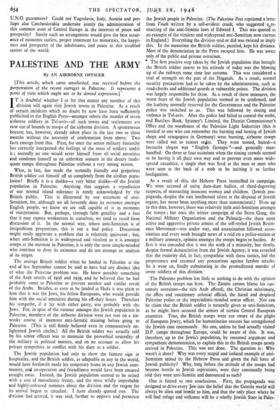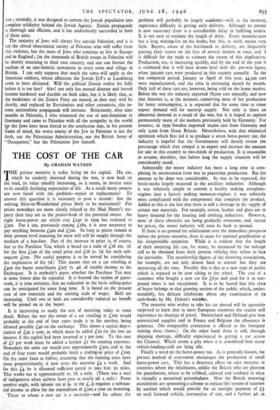PALESTINE AND THE ARMY
By AN AIRBORNE OFFICER
[This article, which came unsolicited, was received before the perpetration of the recent outrages in Palestine. It represents a point of view which ought not to be denied expression.].
IT is doubtful whether I or for that matter any member of this division will again visit Jewish towns in Palestine. As a result of certain incidents which no doubt by now have been.sufficiently publicised in the English Press—amongst others the murder of seven airborne soldiers in Tel-aviv--all such towns and settlements are now out of bounds to troops of the airborne division. A spontaneous boycott has, however, already taken place in the last two or three months without the necessity of confirmation from above. Two facts emerge froM this. First, for once the senior military hierarchy has correctly interpreted the feelings of the mass of soldiery under it ; secondly no one would sever himself from all social amenities and condemn himself to an unbroken sojourn in the dreary inade- quate camps throughout Palestine without a very strong reason.
What, in fact, has made the normally friendly and gregarious British soldier cut himself off so completely from the civilian popu- lation? Briefly it is a dislike—a very bitter dislike—of the Jewish population in Palestine. Anything that suggests a repudiation of our normal island tolerance is rarely acknowledged by the British public. This is illustrated by our treatment of anti- Semitism, for, -although we all fervently deny its existence amongst English people, we know we are still capable of it in moments of exasperation. But, perhaps, through false gentility and a fear that it may expose weaknesses in ourselves, we tend to recoil from discussion of it. In the normal way, where anti-Semitism is of insignificant proportions, this is not a bad policy. Discussion might easily aggravate a problem that is relatively quiescent ; but, when anti-Semitism is as widespread and virulent as it is amongst troops at the moment in Palestine, it is only the most simple-minded who continue to deny its existence and do not attempt an analysis of its origin.
The average British soldier when he landed in Palestine at the end of last September cannot be said to have had any distinct idea of what the Palestine problem was. He knew possibly something of the Arab revolts of 1936 and 1939, and he believed that he had probably come to Palestine to prevent another and similar revolt of the Arabs. Besides, as soon as he landed at Haifa it was plain to him that it was the Jews, his fellow Europeans, who would provide him with the social amenities during his off-duty hours. Therefore his sympathy, if it lay with either party, was probably with the Jews. For, in spite of the rumour amongst the Jewish population in Palestine, members of the airborne division were not sent on a six- weeks course of intensive anti-Semitic training before going to Palestine. (This is still firmly believed even .in comparatively en- lightened Jewish circles.) All the British soldier was actually told by his senior officers was to maintain the proverbial neutrality of the military in political matters, and on no account to allow his private sympathies to conflict with his duty as a soldier.
The Jewish population had only to show the faintest sign of hospitality, and the British soldier, as adaptable as any in the world, would have forthwith made his temporary home in any Jewish com- munity, and co-operation and friendliness would have been ensured straight away. Instead, the Jewish population seemed to be seized with a sort of masochistic frenzy, and the most wildly improbable and highly-coloured rumours about the division and the reason for its arrival began to circulate. I have already quoted one. The division had arrived, it was said, further to oppress and persecute the Jewish people in Palestine. (The Palestine Post reprinted a letter from Truth written by a self-evident crank, who suggested ye- enacting of the anti-Semitic laws of Edward I. This was quoted as an example of the virulent and widespread anti-Semitism now current in England.) Everything the division said or did was twisted to imply this. In the meantime the British soldier, puzzled, kept his distance. Most of the denunciation in the Press escaped him. He was aware only of the public and private ostracism.
" The first positive step taken by the Jewish population that brought the British soldier nearer to his attitude of today wa's the blowing up of the railways some time last autumn. This was considered a trial of strength on the part of the Haganah. As a result, normal security precautions had to be taken by the administration, such as road-checks and additional guards at vulnerable points. The division was largely responsible for these. As a result of these measures, the worst fears of the Jewish population seemed to be confirmed, and the loathing normally reserved for the Government and the Palestine police was switched to us. This was followed by rioting and- violence in Tel-aviv. After the police had failed to control the mobs, and Barclays Bank,'" Spinney's Limited, the District Commissioner'S Office and the warehouse of the Palestine Light Industries (this is ironical to one who can remember the burning and looting of Jewish shops and synagogues in Germany) were burning, airborne troops were called out to- restore order. They were stoned, baited—a favourite slogan was " English Gestapo "—and generally man- handled. On three or four occasions when the rioting crowds seemed to be having it all Aheir own way and to prevent even more wide- spread casualties, a single shot was fired at the man- or men who were seen at the back of a mob to be inciting it to further hooliganism.
As a result of this, the Hebrew Press intensified its campaign. We were accused .of using dumdum bullets, of third-degreeing suspects, of massacring innocent women and children. (Jewish pro- paganda, despite the vast intellectual talent at the disposal of Jewish organs, has never been anything more than conventional) Even up to this date, however, there was relatively little anti-Semitism amongst the troops ; but once the' winter campaign of the Stern Gang, the National Military Organisation and the Pahnacb—the three most active and aggressive private armies of the self-styled Jewish Resist- ance Movement—was under way, and assassination followed assas- sination and every week brought news of a raid on a police-station or a military armoury, opinion amongst the troops began to harden. At first it was conceded that it was the work of a minority, but slowly, despite formal denunciation from the Jewish Agency, it was revealed that the majority did, in fact, sympathise with these tactics, hid the perpetrators and resented any precautions against further attacks. So it went on, finally culminating in the premeditated murder of seven soldiers of this division.
The Palestine problem has little or nothing to do with the opinion of the British troops out here. The Zionist cannot blame his cus- tomary aversions—the rich Arab effendi, the Christian missionary, the effete and reactionary colonial official, the hated and despised Palestine police or the imperialistic-minded senior officer. Nor can he claim that the-British soldier is naturally given to anti-Semitism, as he might have accused the armies of certain Central European countries. True, the British troops were not aware of the plight of European Jewry, which for humanitarian reasons has strengthened the Jewish case enormously. No one, unless he had actually visited D.P. camps throughout Europe, could be aware of this. It was, therefore, up to the Jewish population, by reasoned argument and sympathetic demonstration,"to explain this to the British troops newly arrived in Palestine. This was not done. The question is : Why wasn't it done? Why was every stupid and isolated example of anti- Semitism seized by the Hebrew Press and given the -full force of Jewish publicity? Why, long before the attitude of the troops had become hostile to Jewish aspirations, were they continually being told they were anti-Semitic and denounced as such?
One is forced to two conclusions. First, the propaganda was designed to drive every Jew into the belief that the Gentile world will always be alien and hostile to him, and that the only place where he will find refuge and welcome will be a wholly Jewish State in Pales-
tine ; secondly, it was'designed to cement the Jewish population into complete sordatity behind the Jewish Agency. Zionist ,propaganda is thorough and efficient, and it has undoubtedly succeeded in both of these aims.
The majority of Jews will always live outside Palestine, and it is not the closed chauvinistic society of Palestine who will suffer from this violence, but the mass of Jews who continue to live in Europe and in England ; for the thousands of British troops in Palestine will' be shortly returning to their own country, and one can foresee the nucleus of an anti-Semitic movement in every town and village in Britain. I can only suppose_ that much the same will apply to the American soldiers, whose affections the Jewish D.P.s at Landsberg seem to have alienated. Will the political Zionist realise his folly before it is too late? Alas! not only has mutual distrust and hatred become hardened and durable on both sides, but it is likely that, as the moderates of the Zionist Party are ousted, as they may well be shortly, and replaced by Revisionists and other extremists, this in- tense nationalistic propaganda will increase. Reluctantly, after nine months in Palestine, I who witnessed the rise of anti-Semitism in Germany and came to Palestine with all the sympathy in the world fpr the Jews have been forced to the conclusion that, in his present frame of mind, the worst enemy of the Jew in Palestine is not the Arab, nor the Palestinian Administration, nor the British Army of " Occupation," but the Palestinian Jew himself.































 Previous page
Previous page